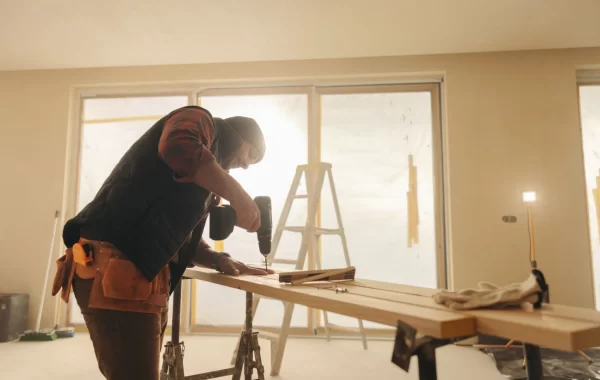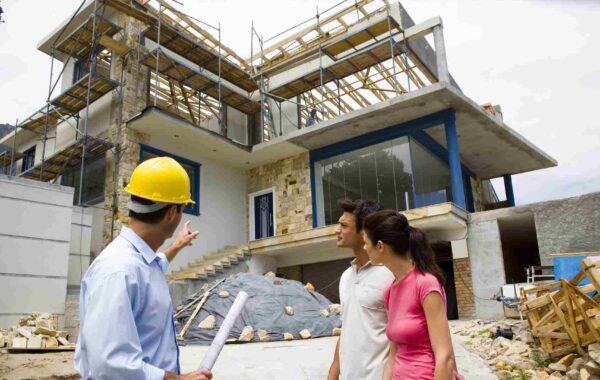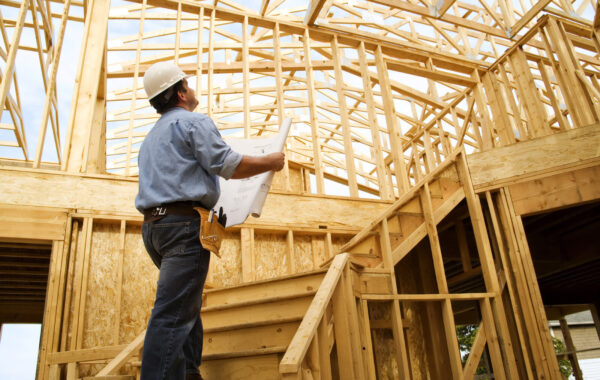
The Role of a Construction Contractor in Home and Business Projects
If you are planning Role of a Construction Contractor or renovation, you probably find yourself wondering where to start. One of the most important decisions will be the choice of a construction contractor. These are the knowledgeable individuals who take advantage of every project’s potential for success by managing time and finances, employing qualified personnel, and acquiring supplies.
Contractors guarantee the timely and budget completion of new homes, office expansions, and one-room remodeling, all while safeguarding compliance with applicable safety and building regulations.
They are the agents that carry out the transformation from architect to client, from blueprint to completion, ensuring quality in their craft. In this blog, we’ll explore the role of a construction contractor and why having the right one can make all the difference in your home or business transformation. Let’s get started!
What Does a General Contractor Do?
Think of a general contractor as the individual who keeps control and productivity within the scope of your home construction or renovation project. They’re involved with everything, including managing subcontractors and vendors and making sure everything meets standards and deadlines.
A general contractor is also your primary contact, coordinating with architects, engineers, interior designers, and other professionals to put your vision into practice. A licensed contractor has the usual process of making sure that everything goes according to the code, eliminating the issues of compliance that you would normally have to deal with. So to sum things up, they take the stress off your back and make sure the job gets done right!
Different Types of Contractors
In construction and renovation works, many contractors have specialized areas that they work on. Knowing who to hire would help a homeowner when it comes to the quality of work and how smoothly the process will run. With that said, here is a quick summary of the different types of contractors and what they do:
1. General Contractor (GC)
General contractors manage all construction or renovation jobs. They manage the subcontractors, daily operations, maintain quality standards, and keep the construction process on schedule and budget. They are responsible for obtaining the required permits and ensuring compliance with codes and regulations. They usually coordinate and become the clients’ main points of reference while making the process easier for homeowners.
2. Specialty Contractors
Unlike general contractors, specialty contractors are types of contractors that work on specific trades within a construction project. Basically, they are experts in their field and get hired for specialized work. Some of the most known specialty contractors are:
- Electricians: Take care of wiring connections, lighting installation, circuit repairs, and all electrical systems.
- Plumbers: Install and repair water supply systems, drainage, and plumbing fixtures.
- HVAC Contractors: Works with heating, ventilation, and air conditioning systems to achieve the goal of providing indoor climate control.
- Roofing Contractors: Install, repair, and replace roofing materials to serve as protection against weather damage.
- Masonry Contractors: Works with bricks, stone, and concrete for the construction of structures like chimneys, walls, and walkways.
3. Subcontractors
Subcontractors work under general contractors and achieve specific works in a broader construction project. Their expertise spans carpentry, drywall, painting, flooring, etc. They do not run the whole project but are crucial in between the works according to the plan and ensuring that quality craftsmanship is maintained in the areas of their trade.
4. Design-Build Contractors
A design-build contractor arranges for design and construction services under a single contract. All planned activities are covered by this contract-including the design of the architecture and the actual building.
This is generally a very cost-effective and time-saving process as there is no need to hire Architects, Designers, and Builders separately. It is fabulous for homeowners who desire a single entity to manage every aspect of their project seamlessly.
5. Demolition contractors
Demolition contractors take care of tearing down structures, whether it is a building or a site, safely and conveniently. They have specialized hands and equipment for the entire process, be it the complete demolition of old homes, removing some internal walls, and clearing lands for new construction, all done with environmental and safety regulations in mind.
6. Excavation contractors
Preparation of the land for construction to commence is excavated and graded. They deal with excavation, site preparation, and grading. A well-prepared construction site starts with a strong foundation, properly dug utility trenches, and carefully graded land to support drainage and overall structural integrity.
7. Renovation and remodeling contractors
The scope of work of these contractors includes enhancing and putting new life into existing homes and buildings. It can be a kitchen upgrade, bathroom remodeling, or a full home remodel, transforming space while keeping the structure intact. Typically, they work and team up with designers and homeowners to bring forth fresh ideas that value property.
Essential Role of a Construction Contractor and Responsibilities of a General Contractor
Here is a rundown of the major responsibilities that a general contractor bears to ensure a successful project:
1. Project Planning & Coordination
The general contractor develops a detailed project plan outlining the project schedule, budget, and scope of work even before construction begins. These fall under:
- Development of a master schedule with key milestones and deadlines.
- Setting clear communication among the property owner, architect, and subcontractors.
- Efficient allocation of resources to maintain costs and avoid any uncalled-for delays.
- Daily progress monitoring and adjustments to keep everything moving.
A structured plan keeps everything flowing smoothly in the construction process and ensures all parties on the project know what to look out for in the project’s goals.
2 . Engaging and Managing Subcontractors
The general contractor does not do all the construction work; he may have specialized subcontractors who can perform various portions of the work. Responsibilities entail:
- Selecting qualified subcontractors for specialty trades such as plumbing, electrical work, roofing, and carpentry.
- Contract negotiations to ensure the subcontractors work within the budget and time outlined in the contract.
- Overseeing the subcontractor’s work to maintain quality standards.
- Resolve the disputes and other issues arising between sub-contractors so that the project does not get delayed.
By managing the subcontractors well, the general contractor can ensure that every aspect of the construction process is carried forth professionally and efficiently.
3. Safety & Legal Compliance
Safety, one of the foremost responsibilities of a general contractor, cannot be stressed enough. These construction sites can be life-threatening. Therefore, safety measures must be taken without question. A general contractor should:
- Set workplace safety measures to reduce risks and accidents.
- Train workers and provide safety equipment.
- Obtain a building permit and ensure that construction activities conform to all local regulations and codes.
- Carry out safety inspections regularly and rectify any hazardous situations immediately.
In this manner, by enforcing safety guidelines and measures, the general contractor will safeguard his workmen, avoid possible legal hurdles, and enable a safe atmosphere at work.
4. Budgeting and Cost Limitations
Keeping a project within its budget is one of the most difficult challenges involved in construction. A general contractor should:
- Prepare for costs in minute detail and apply resources prudently.
- Track expenditures and make real-time adjustments to avoid overspending.
- Traveled as far as reasonable while negotiating with suppliers to reduce the costs of materials and labor.
- Identify and remove any cost that may be considered unnecessary without diminishing the quality of work.
Budgeting manages a project toward financial viability from inception to conclusion.
5. Quality Control and Inspections
It is the general contractor’s responsibility to ensure that all work is done by industry standards, be it for the consideration of the clients or the provision of quality assurance. This includes:
- Site inspections regularly for quality assessment.
- Inspecting materials and workmanship according to contract specifications.
- Making repairs to any defects or issues before they become major problems.
- Coordinating the final inspections and approvals before job completion.
With strong quality control, rework and safety hazards will be eliminated, and delays in delivering the final product will be eliminated in favor of lasting structures with agreeable aesthetics.
6. Communication and Problem-Solving
In any construction project, the general contractor acts as the main point of contact, ensuring proper communication with all involved parties about:
- Informing the client about the status and difficulties of the project.
- Strategies to resolve disagreements between suppliers or subcontractors to prevent delays.
- Changing plans on the fly when unexpected issues arise, such as delays due to weather or supply chain interruptions.
- Achieving this requires the ability to make quick yet informed decisions.
Communication, coupled with efficient problem-solving, ensures that any roadblocks are adequately handled to facilitate the smooth running of construction activities.
7. Site Cleanup and Final Delivery
Furthermore, once construction has been completed, the general contractors are responsible for:
- Ensuring the site is clean with no remaining debris before the handover.
- Implementing a final client walkthrough to address last-minute concerns.
- Taking care of any final touch-ups or corrections before final sign-off.
- Providing documentation for warranty and maintenance suggestions.
A professional and thorough handover completes the project, leaving the client satisfied with the result.
Why Hiring a Professional Contractor is Crucial
Construction projects come with great planning, know-how, and precise implementation- whether it is home renovation, office remodeling, or Role of a Construction Contractor. Some homeowners or business people consider putting the project on themselves to save bucks. However, this usually results in delays, extra costs, and below-par workmanship. A professional contractor will ensure that everything goes cooperatively, timely, and successfully. Here are some reasons why:
1. Knowledge And Experience
Professional contractors bring many years of direct experience and industry knowledge to the project. They would know about:
- The best Role of a Construction Contractor practices for longevity and safety.
- What materials work best for certain environments and within certain budgets?
- How to deal with unexpected adversities such as a shortage of supply, delays on account of weather, or complications in structural design.
Small errors in Role of a Construction Contractor due to lack of expertise have the potential to lead, subsequently, to long-term problems, such as cracking of a foundation, plumbing leaks, or electrical hazards.
2. Time-Saving & Project Management
Role of a Construction Contractor projects must abide by strict timelines to avoid unnecessary delays and added costs. Professional contractors:
- Develop a clear project schedule, with deliverables marked on key milestones.
- Efficiently coordinate with several subcontractors so that work may flow smoothly.
- Anticipate and address potential delays before they become major setbacks.
On the other side, if you try to manage a Role of a Construction Contractor project alone, you will likely encounter numerous delays due to unanticipated challenges, numerous personnel, and suppliers.
3. Savings and Budget Control
Many feel that with DIY home-building, they are saving money, but they are not looking at costs correctly. In the long run, a professional is more affordable in terms of savings because their services keep home-builders within budgets by
- Preventing expensive errors of rework.
- They get better prices on materials since they buy in bulk.
- Introducing cost-effective strategies without compromising quality.
Contractor professionals are educated to avoid situations when poor planning, inaccurate material counting, or subpar installations result in expenditures that surpass the allocated budget.
4 . Compliance and Legal Permitting
Every Role of a Construction Contractor must adhere to the local building laws and regulations as a matter of course. Many project owners are entitled to expect:
- Permits had been obtained before work was carried out. The project is being subjected to the laws, in particular, relevant state and city building laws.
- By maintaining compliance and obtaining necessary approvals, penalties and rework can be prevented.
Building without the model codes can pose fines and even legal issues, possibly leading to the project being destroyed, an eventuality most probably more expensive than hiring a contractor from the onset.
5. Quality and Safety
Building quality is not just for show; it stands for an enormous load of safety and longevity. A licensed contractor ensures:
- Skilled work for durable output.
- Correct installation of basic building, electrical, and plumbing.
- Safe workers and technology, and proper procedures are being correctly used.
Cutting corners or taking short-cuts with unskilled labor can be a threat to life, from full building collapses to bad wiring causing fires or injuries.
Important Guidelines for Selecting the Right Construction Contractor
Choosing the right contractor from the many available is crucial to the project’s success. Well, there are aspects that you may want to consider weighing in on.
1. Experience and Reputation
Check into how many years the contractor has existed in business, as well as their previous projects. Look for testimonials through online reviews and references from previous clients.
2. Licensing and Insurance
The Contractor should have all the necessary licenses and certifications required in your region. The contractor should have insurance coverage against accidents or damage to property while carrying out the work.
3. Portfolio and Specialization
Look at the portfolio to see if they have done works that are similar to what you intend to do. Some contractors do specialize in residential Role of a Construction Contractor while others are more interested in commercial or industrial construction.
4. Price and Contracts Open
An ideal contractor gives intelligent and detailed costs estimate, costing all those needed. Always get a written contract that details the scope of work timelines, payment schedules, and warranty terms.
5. Communication and Professionalism
Good communication is very important in any project. In that case, look for a contractor that will listen to all your needs and questions quickly but will maintain professionalism throughout.
6. Warranty and After-Service Support
A trustworthy contractor stands by their work and offers warranties or post Role of a Construction Contractor support in case any issues arise after the project is completed.
Wrapping Up
As we have discussed the full role of construction contractors in the blog, they are the primary drivers of nearly all residential and commercial Role of a Construction Contractor projects, ensuring that everything proceeds smoothly and at the proper pace from beginning to end.
The contractor’s expertise and management skills cover everything from planning and budgeting to execution and final inspections, thus guaranteeing that the best quality results will be achieved.
If you need assistance with your home or commercial Role of a Construction Contractor project, Total Mobile Restoration is here to help. We bring expert workmanship and exceptionally managed projects to your home. We ensure not only precision and care in every step of the process but also a dedication to delivering top-quality results on every build or renovation.




